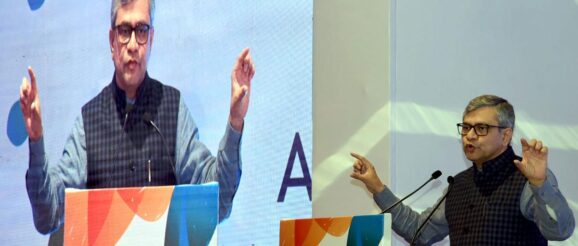IT Minister launches G-20 campaigns for online safety, digital innovation – The Hindu

Inviting the world to make use of the ‘India Stack’ (India’s set of open APIs and digital public goods) and announcing that India would soon also similarly open up its telecom stack, Union Minister of Electronics and Information Technology Ashwini Vaishnaw on Wednesday launched the Stay Safe Online campaign and the Digital Innovation Alliance (DIA) programme, which G-20 Sherpa Amitabh Kant lauded as among the first-ever programmes to be launched worldwide as a G-20 initiative.
At the launch of the campaigns, Secretary, Ministry of Electronics and Information Technology (MeitY), Alkesh Kumar Sharma, said that the DIA is meant to “unite the innovation ecosystems” of G-20 countries and nine invitee countries to recognise and support start-ups developing innovative digital solutions.
The DIA programme will have 174 start-ups from member countries with invitee countries sending in entries for digital solutions in six key sectors – Edtech, Healthtech, Agritech, Fintech, secured digital infrastructure and circular economy, which will be showcased at a three-day event in Bengaluru in August 2023, giving the start-ups a chance to pitch their ideas.
The entries will be judged by a diverse jury, drawn from academia, corporates, Ministers and investors, at the end of which the top three innovations in each sector will be awarded. The event would also provide an opportunity for interactions with stakeholders, esteemed panel discussions and investor connect, Mr. Sharma said.
Meanwhile, the Stay Safe Online campaign intends to raise awareness about cyber risks and the need for cyber hygiene in an increasingly digitising world. The Ministry released a video for this campaign, which asks citizens to share instances of cyber safety online with a hashtag for wider reach and intends to reach all groups of citizens in urban and rural India. The video is also being translated in all U.N. languages and languages of all G-20 countries and invitee countries for global reach, Mr. Sharma said.
Mr. Vaishnaw cited these programmes as examples of how India was on its way to make its presidency of the G-20 significantly different and path-breaking, by adhering to Prime Minister Narendra Modi’s call to make it an action-oriented event for global good rather than just being a “talk-shop”.
The IT Minister went on to offer the world large-scale digital solutions built by India, such as the Unified Payments Interface, suggesting that countries could licence the technology, enter into rights-sharing agreements with India and even set up systems through which Indian companies can handhold interested economies in installing, maintaining and running the technology.
Mr. Vaishnaw said that similarly, India had embarked on an ambitious project of developing its own technology stack (hardware and software) for telecom solutions – 4G and 5G – which has already been tested for 5 million simultaneous connections and soon to be tested for double that strength. “There is huge flexibility here and once we have launched on a large scale in 2023, we will open this up to the world as well,” he said, adding that the government is also working on Bhashini – an AI-based language translator – intended to bridge the language barrier keeping in line with the vision of inclusive digital transformation.
